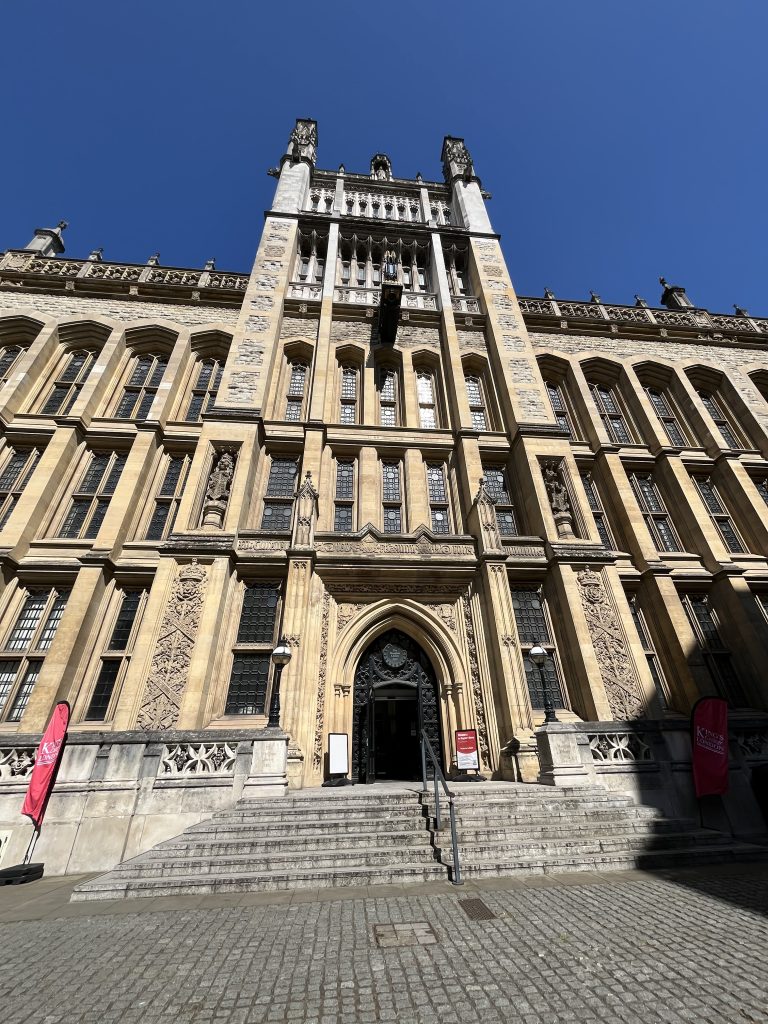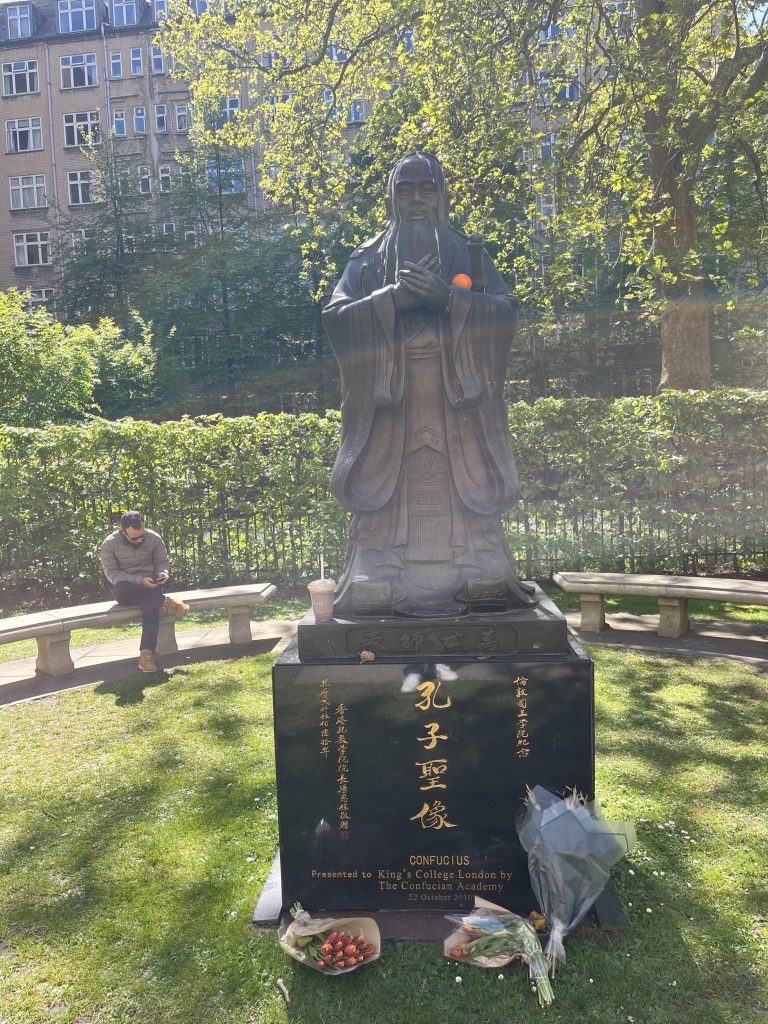“Sharing is good practice, although it may not be human nature.”
Professor Ian Sutherland, Brunel University, Former UK Regional Coordinator, the Consortium for Globalization of Chinese Medicine

Experts’ Fora
Chinese Medicine Forum: Searching the mechanism of Chinese herbal medicine & acupuncture by Dr Tiejun Tang, Honorary Advisor of the King’s CICM Initiative. If you cannot directly get access from WeChat, please copy and paste this link into your preferred web browser and enjoy there: https://chinesemedicinesalon.blogspot.com/2020/02/my-ten-year-blogger-journey.html
Strengths of Traditional Chinese Medicine in the United Kingdom by Prof Dan Jiang, Honorary Advisor of the King’s CICM Initiative. In this online introductory talk before a training course in Hainan, China, in late April 2025, Prof Jiang introduced the current status of TCM practice in the UK, pinpointing the strengths of TCM diagnosis and drug and non-drug interventions in addressing unmet needs of the NHS, e.g., disease prevention; cancer, viral infection and other immunodeficient status; functional and mental disorders; gynaecological disorders and infertility. The talk can be accessed here (You will need to register first or log in through your WeChat account to enjoy and learn): http://m.qihuanghealthcare.cn/live/detail/1640
Zhongzhen’s Forum on Bencao Gang Mu and Chinese materia medica by Prof. Zhongzhen Zhao, Honorary Advisor of the King’s CICM Initiative— please scan and enjoy via WeChat:

Professional Societies and Consortia
International societies and consortia
- Consortium for Globalization of Chinese Medicine (CGCM), an international consortium promoting collaborations in TCM research for the global needs of all peoples: https://www.tcmedicine.org
- European Traditional Chinese Medicine Association(ETCMA) – an umbrella organisation for professional associations that represents different fields within TCM: https://etcma.org/
- Good Practice in Traditional Chinese Medicine Research Association (GP-TCM RA), an international society established by the European Commission-funded FP7 GP-TCM Project, is dedicated to the development, dissemination and implementation of good practices in TCM research: https://www.gp-tcm.org
- Free ordinary and student memberships: http://www.gp-tcm.org/index.php/membership/
- Open-access newsletters: http://www.gp-tcm.org/index.php/news/
- International Society for Ethnopharmacology (ISE), an international society for pharmacological studies of traditional and integrative medicine: https://ethnopharmacology.org
- Society for Medicinal Plant and Natural Product Research (GA), an international society for R&D of natural products, especially botanical drugs: https://ga-online.org
- World Traditional Medicine Forum (WTMF), the most comprehensive, up-to-date and authoritative information on traditional medicine: http://www.worldtmf.org
- Integrated Health Services, World Health Organization, the WHO Department specialised in promoting holistic care; its Traditional, Complementary and Integrative Medicine Unit develops the integration of proven traditional and complementary medical practices into health systems: https://www.who.int/teams/integrated-health-services
Professional societies and consortia in the UK
- Association of Traditional Chinese Medicine and Acupuncture (ATCM) https://www.atcm.co.uk/
- British Acupuncture Council (BAcC), UK’s largest, member-led, professional body for traditional acupuncturists. with nearly 3,000 members: https://acupuncture.org.uk
- British Society of Chinese Medicine (BSCM), Promoting the Knowledge, Wisdom and Power of Chinese Medicine: https://www.bscm.org.uk
- Chinese Acupuncture and Herbal Medicine Alliance UK (CAHMA) is a special group of qualified acupuncturists and herbal practitioners who practice and provide a high standard health care services for the people in the UK. https://www.cahma.co.uk
- Chinese Medicine Alliance UK (CMA), a professional organisation and a self-regulating body of Chinese medicine and acupuncture in the UK. It brings together high-quality Chinese medicine practitioners from all over the nations: https://www.thecmauk.org/home
- Federation of Traditional Chinese Medicine Practitioners (FTCMP) striving for a legal status of TCM in the UK: https://ftcmp.co.uk/en/home/
- Register of Chinese Herbal Medicine (RCHM), dedicated to promoting safe and ethical practice of Chinese Medicine in the UK; the only organisation in the UK that focuses on the herbal element of TCM: https://www.rchm.co.uk/
- Research Council of Complementary Medicine (RCCM)– an organisation promoting research that will widen the availability of and access to safe and effective complementary medicine for patients within the NHS in the UK, helping prevent disease and improve patients’ health and quality of life: https://www.rccm.org.uk/
- UK Centre of Chinese Medicine (CCMUK), an independent, not-for-profit, UK-based organisation created to support the development of high-standard Chinese medicine: https://ccmuk.org
Strategic Visions & Priorities We Observe
- Draft WHO Traditional Medicine Strategy 2025-2034: https://cdn.who.int/media/docs/default-source/tci/draft-traditional-medicine-strategy-2025-2034.pdf?sfvrsn=dd350962_1
- WHO Health Priorities: In Feb. 2025, the WHO Executive Board resolution recognised kidney disease, mental health, cancer, heart disease, stroke, diabetes and respiratory disease as global health priorities: https://apps.who.int/gb/ebwha/pdf_files/EB156/B156_(20)-en.pdf
- Convention on Biological Diversity: Signed by 150 government leaders at the 1992 Rio Earth Summit, the Convention on Biological Diversity is dedicated to promoting sustainable development: https://www.cbd.int/convention
- King’s Strategy and Vision 2029: https://www.kcl.ac.uk/about/strategy
- The Priorities of the NHS: https://www.longtermplan.nhs.uk/publication/the-nhs-in-england-at-75-priorities-for-the-future/
International Standards and Guidelines
General guidelines for biomedical research:
- World Medical Association Declaration of Helsinki – Ethical Principles For Medical Research Involving Human Participants: https://www.wma.net/policies-post/wma-declaration-of-helsinki/
- World Medical Association Declaration of Taipei on Ethical Considerations Regarding Health Databases and Biobanks: https://www.wma.net/policies-post/wma-declaration-of-taipei-on-ethical-considerations-regarding-health-databases-and-biobanks/
- COPE guidelines (Publication ethics): https://publicationethics.org/guidance-and-tools
- Guidelines for Risk Assessment in the Utilisation of Medicinal Fauna and Flora: https://www.traffic.org/publications/reports/tcm-risk-guidelines/
- CONSORT (RCT): https://www.equator-network.org/reporting-guidelines/consort/
Note: Extensions directly related to traditional medicines (Acupuncture, Cupping, Tuina/Massage, herbal intervention, Chinese Herbal Medicine Formula, Integrated Chinese and Western, Non-Drug interventions, N-of-1, N-of-1 TCM, Reporting Single Group Trial for TCM, as we as Extensions for new types of RCTs suitable for innovative TCM studies, such as Basket, Umbrella and Platform trials, de-centralised trials, adaptive designs and pragmatic trials, cluster and stepped wedge cluster trials) can be found here: https://www.equator-network.org/?post_type=eq_guidelines&eq_guidelines_study_design=0&eq_guidelines_clinical_specialty=0&eq_guidelines_report_section=0&s=+CONSORT+extension&btn_submit=Search+Reporting+Guidelines
- PRISMA (systematic review): https://www.equator-network.org/reporting-guidelines/prisma/
Note: the PRISMA extensions directly related to TCM (e.g. for acupuncture, moxibustion, Chinese herbal medicine; and special types of systematic reviews (e.g. PRISMA-ScR for Scoping review) can be found here: https://www.equator-network.org/?post_type=eq_guidelines&eq_guidelines_study_design=0&eq_guidelines_clinical_specialty=0&eq_guidelines_report_section=0&s=PRISMA+extension&btn_submit=Search+Reporting+Guidelines
- GRADE (Grading of Recommendations, Assessment, Development, and Evaluations), the most widely adopted tool for grading the quality of evidence and for making recommendations, endorsed by over 100 organisations worldwide: https://www.gradeworkinggroup.org/
- GATHER (Accurate and Transparent Health Estimates Reporting): https://data.who.int/about/data/gather
- SAGER (Sex and Gender): https://ease.org.uk/communities/gender-policy-committee/the-sager-guidelines/
- PREPARE (animal study): https://norecopa.no/prepare
- ARRIVE 2.0 (animal study): https://arriveguidelines.org/arrive-guidelines
Note: ARRIVE extension for Acupuncture
- GCCP 2.0 (cell study): https://www.altex.org/index.php/altex/article/view/2376
- MIQE (PCR): https://en.wikipedia.org/wiki/MIQE
Special international standards, guidelines and extensions for traditional, complementary and integrative medicine
Nomenclature, terminologies and translation
- WHO international standard terminologies on traditional Chinese medicine. 2022; pp1-453 (3415 terms): https://www.who.int/publications/i/item/9789240042322
- WHO international standard terminologies on traditional medicine in the Western Pacific Region. 2007: pp1-356(3543 terms): https://iris.who.int/handle/10665/206952
- WHO. Chapter 26. Supplementary Chapter Traditional Medicine Conditions – Module I. ICD-11. International Classification of Diseases 11th Revision; The global standard for diagnostic health information. 1999; in effect, Jan. 2022: https://icd-11.online/29561
- WHO standards in acupuncture nomenclature: https://www.who.int/publications/i/item/9290611057
- World Flora Online plant names: https://wfoplantlist.org/plant-list
- WFCMS. International Standard Chinese-English Basic Nomenclature of Chinese Medicine, Beijing: People’s Medical Publishing House. 2008; pp 1-789 (6526 terms)
WHO quality control guidelines
- WHO General Guidelines for Methodologies on Research and Evaluation of Traditional Medicine: https://www.who.int/publications/i/item/9789241506090
- TRS 1010 – Annex 1: WHO Good Manufacturing Practices for the manufacture of herbal medicines: https://www.who.int/publications/m/item/trs1010-annex1
- WHO Guidelines on Good Manufacturing Practices for Herbal Medicines: https://www.who.int/publications/i/item/9789241547161
- WHO Guidelines for Selecting Marker Substances of Herbal Origin for Quality Control of Herbal Medicines: https://www.who.int/publications/m/item/trs1003-annex1
- WHO benchmarks for the training of acupuncture: https://www.who.int/publications/i/item/9789240017962
- WHO benchmarks for the practice of acupuncture: https://www.who.int/publications/i/item/978-92-4-001688-0
- WHO benchmarks for the training of Ayurveda: https://iris.who.int/handle/10665/351480
- WHO benchmarks for the practice of Ayurveda:: https://www.who.int/publications/i/item/9789240042674
- WHO benchmarks for the training of Tuina: https://www.who.int/publications/i/item/9789241599689
- WHO benchmarks for the practice of Tuina: https://qualityhealthservices.who.int/quality-toolkit/qt-catalog-item/who-benchmarks-for-the-practice-of-tuina
- WHO benchmarks for the training of Unani medicine: https://www.who.int/publications/i/item/9789240042735
- WHO benchmarks for the practice of Unani medicine: https://www.who.int/publications/i/item/9789240042698
Other quality control guidelines and international standards
- ISO/TC 249, International standards on the quality, safety and manufacture processes of TCM materials and products published by the International Standardization Organization: https://www.iso.org/committee/598435.html
- WFCMS international standards on TCM subdisciplines, education, assessment, pharmacy, clinics, consultation, consultation, diagnosis and treatment, TCM drug prescription, formulation, packaging and decoction, functional food, device and non-drug therapies: http://www.wfcms.org/index.php/list/52.html
- ConPhyMP guidelines and online interactive tool for what is needed in the reporting pharmacology, toxicology and clinical effects of herbals: https://ga-online.org/best-practice
- GP-TCM guideline on reviewing and publishing studies on herbal medicine, with special emphasis on traditional Chinese medicine and Chinese materia medica: https://www.sciencedirect.com/science/article/pii/S0378874112000517
Key References (classic references are listed at the end)
Xu Q. WHO International Standard Terminologies on Traditional Chinese Medicine: Use in Context, Creatively. Integr Med Nephrol Androl. 2023;10:e00029. https://journals.lww.com/imna/Fulltext/2023/06000/WHO_International_Standard_Terminologies_on.29.aspx
Ma P, et al. The SHARE: SHam Acupuncture REporting guidelines and a checklist in clinical trials. J Evid Based Med. 2023;16:428-431. https://onlinelibrary.wiley.com/doi/10.1111/jebm.12560
Zhang X, et al. STandards for Reporting Interventions in Clinical Trials Of Tuina/Massage (STRICTOTM): Extending the CONSORT statement. J Evid Based Med. 2023;16:68-81. https://onlinelibrary.wiley.com/doi/10.1111/jebm.12522
Duan Y, et al. A cross-sectional study of the endorsement proportion of reporting guidelines in 1039 Chinese medical journals. BMC Med Res Methodol. 2023;23:20. https://bmcmedresmethodol.biomedcentral.com/articles/10.1186/s12874-022-01789-1
Shepherd A, et al. Botanicals in the health and disease of the testis and male fertility: a scoping review. Phytomedicine. 2022;106:154398. https://www.sciencedirect.com/science/article/pii/S0944711322004871?via%3Dihub
Heinrich M, et al. Best Practice in the chemical characterisation of extracts used in pharmacological and toxicological research: The ConPhyMP Guidelines. Front Pharmacol 2022;13:953205: https://www.frontiersin.org/journals/pharmacology/articles/10.3389/fphar.2022.953205/full
Heinrich M, et al. Best practice in research – Overcoming common challenges in phytopharmacological research. J Ethnopharmacol 2020; 246:112230: https://www.sciencedirect.com/science/article/pii/S0378874119330338
Zhang X, et al. Standards for reporting interventions in clinical trials of cupping (STRICTOC): extending the CONSORT statement. Chin Med. 2020;15:10. https://cmjournal.biomedcentral.com/articles/10.1186/s13020-020-0293-2
Smith AJ. Guidelines for planning and conducting high-quality research and testing on animals. Lab Anim Res. 2020;36:21. https://labanimres.biomedcentral.com/articles/10.1186/s42826-020-00054-0
Smith AJ et al. PREPARE: guidelines for planning animal research and testing. Lab Anim. 2017;52:135-141. https://pmc.ncbi.nlm.nih.gov/articles/PMC5862319/
Cheng CW, et al. CONSORT Extension for Chinese Herbal Medicine Formulas 2017: Recommendations, Explanation, and Elaboration. Ann Intern Med. 2017;167:112-121. https://www.acpjournals.org/doi/full/10.7326/M16-2977?
Pelkonen O, et al. Why is research on herbal medicinal products important and how can we improve its quality? J Tradit Complement Med. 2014;4:1-7. https://www.sciencedirect.com/science/article/pii/S2225411016302048
Xu Q et al. The quest for modernisation of traditional Chinese medicine. BMC Complement Altern Med. 2013;13:132: https://bmccomplementmedtherapies.biomedcentral.com/articles/10.1186/1472-6882-13-132
Buriani A, et al. Omic techniques in systems biology approaches to traditional Chinese medicine research: present and future. J Ethnopharmacol. 2012;140:535-44: https://www.sciencedirect.com/science/article/pii/S0378874112000682?via%3Dihub
Uzuner H, et al. Traditional Chinese medicine research in the post-genomic era: good practice, priorities, challenges and opportunities. J Ethnopharmacol. 2012;140:458-68: https://www.sciencedirect.com/science/article/pii/S0378874112001110?via%3Dihub
Chan K, et al. Good practice in reviewing and publishing studies on herbal medicine, with special emphasis on traditional Chinese medicine and Chinese materia medica. J Ethnopharmacol. 2012;140:469-75: https://www.sciencedirect.com/science/article/pii/S0378874112000517?via%3Dihub
Flower A, et al. Guidelines for randomised controlled trials investigating Chinese herbal medicine. J Ethnopharmacol. 2012;140:550-4: https://www.sciencedirect.com/science/article/pii/S0378874111008956?via%3Dihub
MacPherson H, et al. Revised STandards for Reporting Interventions in Clinical Trials of Acupuncture (STRICTA): extending the CONSORT statement. Acupunct Med. 2010;28:83-93.
Gagnier JJ, et al. Reporting RCTs of herbal interventions: an elaborated CONSORT statement. Ann Intern Med. 2006;144:364-7: https://www.acpjournals.org/doi/10.7326/0003-4819-144-5-200603070-00013?
Please share with your network—together, we can transform health research and care.
